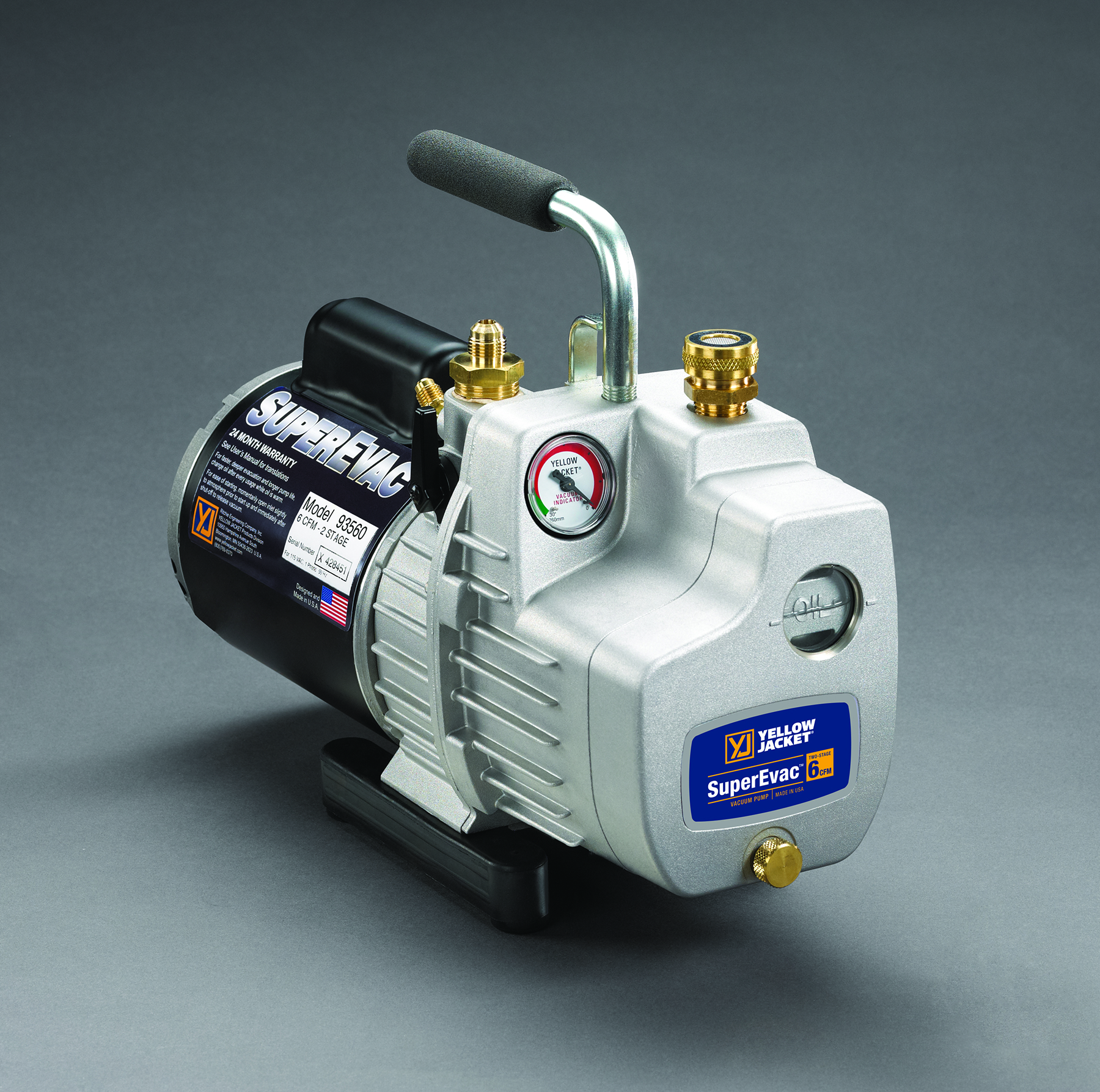Yes, a vacuum pump can remove oil from an AC system alongside moisture and contaminants. It helps ensure the proper functioning of the AC system by creating a vacuum.
A vacuum pump is essential for maintaining the efficiency and longevity of an air conditioning (AC) system. During service or repair works, technicians use vacuum pumps to extract moisture, air, and other gases. The process is critical because it prevents potential chemical reactions that can lead to system deterioration.
By applying a deep vacuum, these pumps can also remove oil trapped within the AC components, ensuring that any new refrigerant added isn’t contaminated with residual old oil or other substances. This is vital for the optimal performance of the AC unit because mixing old oil with new refrigerant can compromise system efficiency and, in some cases, cause damage. Technicians routinely rely on vacuum pumps to prepare AC systems for recharging with refrigerant, a process that is indispensable for climate control systems in both automotive and HVAC applications.

Credit: www.amazon.com
Introduction To Vacuum Pumps In Ac Systems
Welcome to the world of HVAC maintenance, where keeping your air conditioning system in top shape is key. The heart of routine upkeep? An understanding of the role vacuum pumps play in ensuring systems run smoothly. A vacuum pump isn’t just a tool; it’s an essential part of the cleaning process.
Overview Of Air Conditioning System Maintenance
Regular maintenance of an AC system is crucial. A well-maintained unit works efficiently, saves energy, and prolongs lifespan. Here’s a snapshot of essential maintenance tasks:
- Inspecting filters, coils, and fins
- Checking thermostat settings
- Ensuring the condensate drain is unblocked
- Professional inspection at seasonal intervals
Incorporating these steps helps minimize breakdowns. It ensures your unit is ready to handle extreme temperatures.
The Role Of Vacuum Pumps In Ac Systems
Vacuum pumps are vital for deep cleaning an air conditioning system. They remove moisture and non-condensable gases, which could harm the system’s efficiency. Here’s how they contribute:
| Function | Benefit |
|---|---|
| Removing air | Prevents corrosion and system malfunctions |
| Evacuating moisture | Ensures optimal refrigerant interaction |
During service, the vacuum pump is connected to the AC system. It pulls a vacuum for a set period. This ensures the removal of all unwanted substances, leaving the system clean and functioning properly.
Understanding The Need For Oil Removal In Ac Systems
When we think of air conditioning systems, cool air is the first thing that comes to mind. But, AC systems have another crucial element – oil. This oil lubricates the compressor, ensuring smooth operation. Over time, however, oil in an AC system can become contaminated. Removing this oil is key to maintaining efficiency and performance. Let’s break down why clean oil is vital and the impact of oil contamination on AC systems.
The Importance Of Clean Oil For Ac Efficiency
Clean oil maintains the air conditioner’s life and efficiency. Here’s what clean oil does:
- Lubricates moving parts to reduce wear and tear.
- Keeps the system running smoothly, avoiding unnecessary strain.
- Helps in heat dissipation, preventing overheating.
Maintaining oil purity is essential for a healthy AC system. Vacuum pumps play a critical role in this process by extracting old and contaminated oil.
Consequences Of Oil Contamination In Ac Systems
Impurities in oil can lead to various issues:
| Consequence | Description |
|---|---|
| Reduced Efficiency | Contaminated oil causes the system to work harder. |
| Component Damage | Impure oil can damage parts over time, leading to failures. |
| System Failure | A buildup of impurities can result in a total breakdown. |
Keeping oil clean is not an option, it’s a necessity for an AC’s longevity and performance. Vacuum pumps are the tools that help achieve this by removing contaminated oil efficiently.
Mechanics Of A Vacuum Pump
A vacuum pump is an essential tool for HVAC technicians. It removes air and moisture from an AC system. This process is crucial for maintaining your air conditioner’s effectiveness and longevity.
How Vacuum Pumps Work
Vacuum pumps pull air and vapors out of the AC system. This creates a low-pressure environment. With lower pressure, boiling points of liquids drop. Moisture and non-condensable gases get removed effectively.
- Air and gases are sucked out through an inlet port.
- They get trapped and are moved to the pump’s exhaust.
- Vacuum creates a pressure difference, aiding in removing contaminants.
Different Types Of Vacuum Pumps Used In Ac Systems
Several types of vacuum pumps ensure efficiency in AC service works. Let’s look at the common ones:
| Type | Use | Benefit |
|---|---|---|
| Single-Stage | Small to medium AC systems | Cost-effective for basic tasks |
| Two-Stage | Larger, commercial AC systems | Stronger vacuum for deeper moisture removal |
| Rotary Vane | General AC service | Durable and reliable performance |

Credit: appiontools.com
The Process Of Removing Oil With A Vacuum Pump
Keeping an AC system in tip-top shape requires regular maintenance. One frequent question is, can a vacuum pump remove oil from an AC system? The answer lies in understanding the role of a vacuum pump in the maintenance workflow.
Step-by-step Guide To Using A Vacuum Pump
A vacuum pump serves as a critical tool in extracting contaminants. To ensure efficient removal, follow these steps:
- Turn off the AC system and gain access to the service ports.
- Connect the vacuum pump’s hose to the service port.
- Turn on the vacuum pump and let it run for 15-30 minutes.
- Monitor the system’s pressure gauge for stability.
- Once done, close the service port and disconnect the pump.
Determining If Oil Can Be Removed By A Vacuum Pump
Oil removal via a vacuum pump requires a thorough understanding:
- Check the system’s specs for oil management.
- Verify if the vacuum pump has an oil capture feature.
- Assess the oil level through sight glasses where available.
Oil removal is possible, mostly when it comes to moisture and small contaminants.
Limitations Of Vacuum Pumps In Oil Removal
Vacuum pumps serve an essential role in maintaining AC systems. However, their effectiveness in oil removal has limits. Understanding these restrictions can help in proper AC maintenance.
Why Vacuum Pumps Cannot Remove Oil Completely
Vacuum pumps excel in extracting moisture and air from AC systems, but they aren’t designed to remove oil thoroughly. Here’s why:
- Oils have high boiling points, making it difficult for vacuum pumps to vaporize and extract them.
- Oil often gets trapped in various AC components, beyond the reach of a vacuum pump’s pull.
- Viscosity differences in the oil can impact the vacuum pump’s ability to remove it.
Alternative Methods For Oil Removal From Ac Systems
For complete oil removal, AC professionals rely on the following methods:
| Method | Description | Use Case |
|---|---|---|
| Refrigerant Recovery | Uses a machine to reclaim refrigerant and oil | For major system repairs or service |
| Flushing | Employs chemicals or solvents to clean out oil | After a system failure or contamination |
| Component Replacement | Swaps contaminated parts with new ones | Replacement of parts like filters and dryers |
Each alternative targets oil removal efficiently, ensuring clean and functional AC systems.

Credit: yellowjacket.com
Best Practices When Removing Oil From Ac Systems
Understanding the best practices when removing oil from AC systems is crucial for both efficiency and the longevity of your HVAC. A vacuum pump is a potent tool in this process. Let’s explore how to execute this with precision.
Preventive Measures To Avoid Oil Contamination
Oil can degrade the performance of your AC system. Preventing contamination should always be a priority. Here’s what to do:
- Regularly check for leaks and seal them promptly.
- Use clean tools and equipment to avoid introducing impurities.
- Maintain proper refrigerant levels to prevent system stress.
Recommended Equipment For Efficient Oil Removal
The right tools make all the difference. Here are the key items for efficient oil removal:
| Equipment | Function |
|---|---|
| Vacuum Pump | Extracts contaminants and moisture, setting the stage for effective oil removal. |
| Recovery Unit | Recaptures refrigerant, which includes the oil mixture for disposal or reuse. |
| Filter Drier | Removes moisture and particles, which helps prevent oil contamination. |
Conclusion: Vacuum Pumps’ Efficacy In Ac Maintenance
When it comes to keeping an AC system running smoothly, a vacuum pump plays a crucial role. Not only does it ensure the removal of air and moisture, but it is also instrumental in extracting old oil from the system. This process is essential for preventing contamination and ensuring that your AC operates at its best.
Summary Of Vacuum Pumps’ Role In Oil Removal
A vacuum pump does more than just suck out air; it purges the AC system of old oil. This is key to maintaining the system’s efficiency and preventing mechanical issues. Here’s a quick rundown of how these pumps aid in oil removal:
- Create a low-pressure environment which causes the oil to flow out.
- Draw contaminants and old oil out of the AC system.
- Prepare the system for the addition of fresh oil and refrigerant.
Future Directions In Ac System Servicing Technology
Innovations in AC system servicing continue to advance. The introduction of smart diagnostic tools and automated flushing systems are on the horizon. These breakthroughs will make oil and contaminant removal even more efficient. Technicians can look forward to:
- Enhanced precision in detecting system issues.
- Reduced maintenance times thanks to automated processes.
- Eco-friendly disposal methods for used oil and chemicals.
Frequently Asked Questions Of Does A Vacuum Pump Remove Oil From Ac System?
How Do I Remove Excess Pag Oil From My Ac?
To remove excess PAG oil from your AC system, carefully extract it using a refrigerant recovery machine. Ensure system compatibility and consult your vehicle’s service manual for specific instructions. Dispose of old oil responsibly.
Does Evacuating An Auto Ac System Remove The Oil?
Evacuating an auto AC system can remove some oil, as oil circulates with the refrigerant. Ensure proper oil levels post-evacuation.
What Does A Vacuum Pump Do For Ac?
A vacuum pump removes air and moisture from an AC system, ensuring proper function and efficient cooling.
Do You Need To Add Oil After Vacuuming Ac System?
After vacuuming an AC system, you must add the appropriate type of oil in the correct amount, as specified by the manufacturer’s guidelines, to ensure the system functions properly.
Conclusion
Wrapping up, a vacuum pump does indeed extract oil from an AC system effectively. Regular maintenance with this tool can prolong your system’s efficiency and performance. Don’t overlook the importance of professional advice for optimal results. Keep your AC running smoothly and enjoy a comfortable environment.
How to Remove Pag Oil from Ac System?
How to Replace Ac Compressor Without Vacuum?
How Much Does It Cost to Replace an Ac Compressor in a Car?
When to Replace Ac Compressor in a Car?
How Long Does It Take a Mechanic to Replace an Ac Compressor in a Car?





